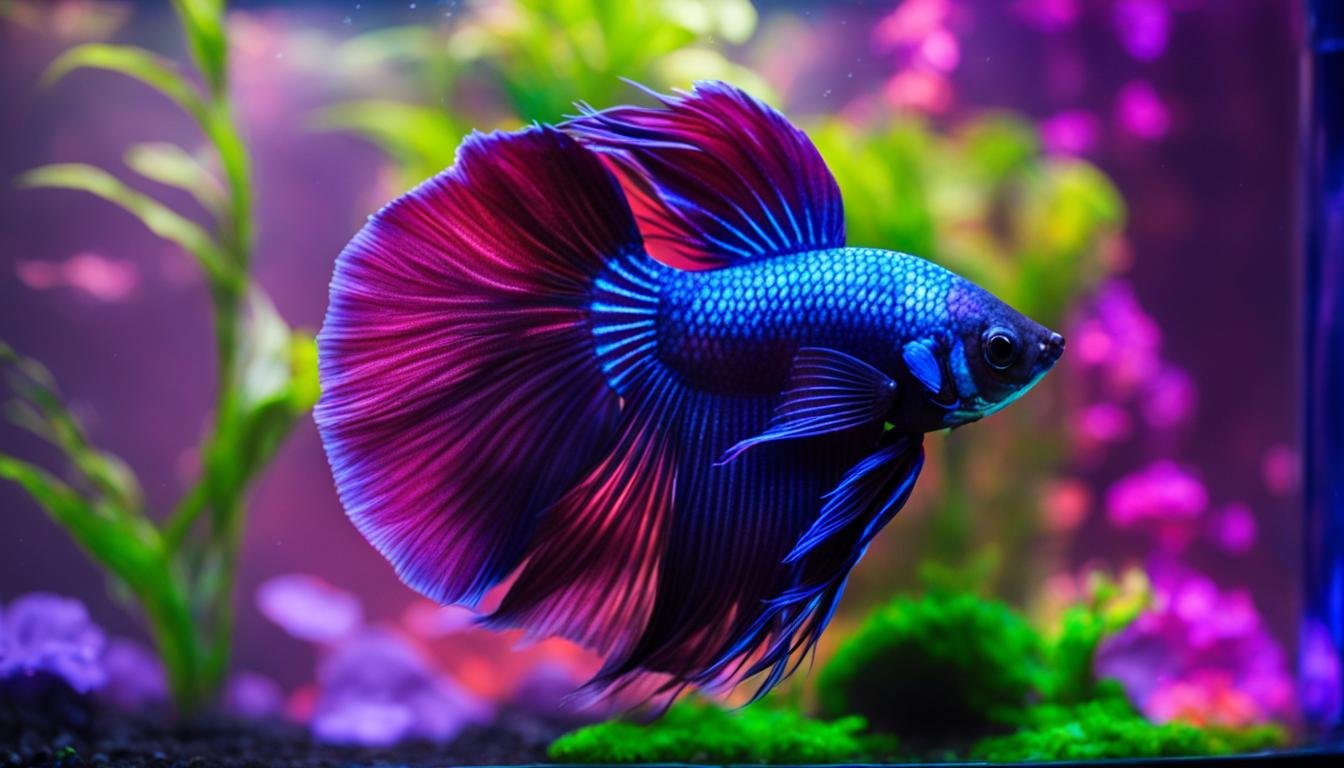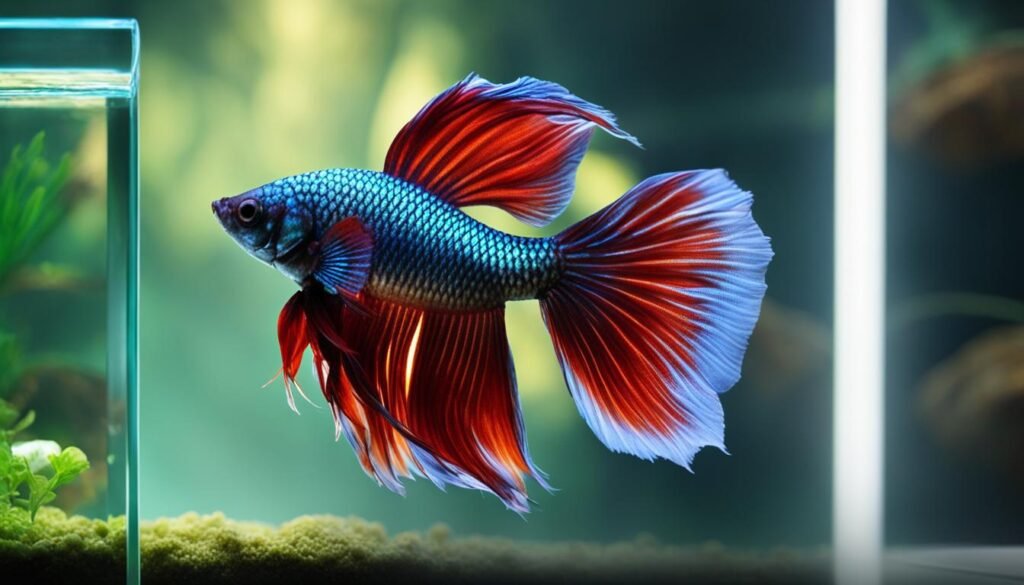Your cart is currently empty!

Do Betta Fish Like Color Changing Lights? An Insightful Guide.
Betta fish, also known as Siamese fighting fish, are fascinating creatures that thrive in their underwater habitats. As caretakers of these beautiful fish, it is our responsibility to provide them with the best possible care, including suitable lighting conditions. One question that often arises is whether betta fish like color changing lights. In this guide, we will explore the behavior and care of betta fish, shedding light on the topic of color changing lights and their impact on these magnificent creatures.
Understanding betta fish behavior and their natural habitat is essential to creating a harmonious environment for them. Betta fish originate from shallow waters where sunlight filters through vegetation. Replicating these lighting conditions is crucial for their well-being. LED lights have revolutionized the lighting landscape, offering energy efficiency and versatility. But what about color changing lights?
While color changing lights may seem visually appealing to us, it’s important to consider the impact they have on betta fish. In this guide, we will delve into the world of LED technology, explore the lighting requirements of betta fish, and discuss how to choose the right LED lighting for their tanks. By understanding these factors, we can create an optimal lighting environment that promotes the health and happiness of our betta fish.
Key Takeaways:
- Understanding betta fish behavior and their natural habitat is crucial for providing optimal care.
- Replicating the lighting conditions of their natural habitat is essential for betta fish well-being.
- LED lights offer energy efficiency and versatility for creating suitable lighting environments.
- Color changing lights may impact betta fish behavior and should be considered carefully.
- Choosing the right LED lighting options and balancing lighting parameters is crucial for betta fish health.
Understanding Betta Fish Habitat and Lighting Requirements
Betta fish are fascinating creatures that require specific lighting conditions to thrive in their habitat. Understanding their natural environment and lighting requirements is essential for their well-being.
Betta fish originate from shallow waters where sunlight filters through vegetation. Therefore, replicating these lighting conditions in their tanks is crucial. The light should mimic full spectrum sunlight, providing a blend of warm and cool colors to simulate the gradual changes of sunlight throughout the day.
When it comes to lighting duration, betta fish require a regular light cycle of moderate to bright light intensity. A photoperiod of 10-12 hours of light followed by a period of darkness is ideal. This helps to support their natural behavior and overall health. Gradual transitions in light variability should also be provided to create a more natural and comfortable environment for the fish.
Key Points:
- Betta fish require lighting conditions that mimic their natural habitat.
- The light spectrum should replicate full spectrum sunlight with warm and cool colors.
- A regular light cycle of moderate to bright light intensity is necessary.
- A photoperiod of 10-12 hours of light followed by a period of darkness is recommended.
- Gradual transitions in light variability create a more natural environment for betta fish.
Demystifying LED Technology and Spectra

LED lights have revolutionized the lighting landscape with their energy efficiency and versatility. Understanding the technology and spectra behind these lights is crucial when considering LED lighting options for your betta fish tank.
LED technology, or Light Emitting Diode technology, utilizes a semiconductor to produce light. This technology is highly efficient, converting a significant portion of electrical energy into visible light. LED lights are long-lasting and have a low heat output, making them ideal for aquarium lighting.
The Importance of LED Spectra
When it comes to LED lighting options, it’s essential to consider the light spectrum. The spectrum of light emitted by LEDs can be customized to meet the specific needs of your betta fish. Betta fish require a spectrum that mimics natural sunlight, including both warm and cool colors.
The spectrum of light affects not only the visual appeal of your aquarium but also the behavior and well-being of your betta fish. Red and blue light, for example, can enhance the vibrant colors of your fish and promote their natural behaviors. It’s important to strike a balance and provide a diverse spectrum to create a harmonious environment for your betta fish.
Choosing the Right LED Lighting Option
When it comes to LED lighting options for betta fish tanks, there are several choices available. LED linear lights, LED panel lights, tracking lights, indoor spotlights, and LED strip lights are all viable options that can be adjusted to provide the desired light spectrum and intensity.
LED linear lights and LED panel lights are known for their even light distribution and versatility. Tracking lights and indoor spotlights offer focused lighting, allowing you to highlight specific areas of your tank. LED strip lights provide flexibility and aesthetic appeal, allowing you to create stunning visual effects.
By understanding LED technology and spectra, you can make an informed decision when choosing the right LED lighting for your betta fish tank. Careful consideration of the light spectrum and intensity will ensure the health and well-being of your fish while creating a visually appealing aquarium environment.
Choosing the Right LED Lighting for Betta Fish Tanks
When it comes to selecting LED lighting for your betta fish tank, there are several options to consider. Each type of LED light offers its own advantages and can contribute to creating a vibrant and visually appealing aquarium environment. Let’s take a closer look at the different LED lighting options available:
1. LED Linear Lights:
LED linear lights provide even light distribution and are versatile in their application. They are excellent for illuminating the entire tank, ensuring that every corner is well-lit. With their sleek and slim design, LED linear lights can seamlessly blend into the aquarium setup, offering a clean and unobtrusive look.
2. LED Panel Lights:
LED panel lights are another popular choice for betta fish tanks. They offer a broader light distribution, making them suitable for larger tanks. LED panel lights emit a soft and diffused light that can help create a calm and relaxing atmosphere for your betta fish.
3. Tracking Lights and Indoor Spotlights:
If you are looking to highlight specific features in your tank, such as plants or decorative elements, tracking lights and indoor spotlights can be the ideal choice. These lights provide focused illumination and can draw attention to specific areas, adding depth and visual interest to your aquarium.
4. LED Strip Lights:
For those who want to add a touch of creativity and customization to their betta fish tank, LED strip lights are a fantastic option. These flexible strips can be easily installed along the edges of the tank or hidden behind decorations to create stunning visual effects. LED strip lights can be adjusted to various colors and provide a captivating display.
When choosing the right LED lighting for your betta fish tank, consider the specific needs of your fish and the overall aesthetic you wish to achieve. It’s important to strike a balance between the light spectrum and intensity to ensure the well-being and behavior of your betta fish. With a carefully selected LED lighting option, you can create a visually stunning and harmonious environment for your beloved fish.
Navigating the Balance: Lighting and Betta Fish Health
When it comes to betta fish health, lighting is an important aspect to consider. However, it is just one piece of the puzzle. To ensure the well-being of your betta fish, it’s essential to strike a balance between lighting and other environmental factors.
Water quality: Maintaining optimal water quality is crucial for the health of betta fish. Regular water changes, proper filtration, and monitoring water parameters such as temperature, pH, and ammonia levels are essential. Clean, well-maintained water creates a healthy environment for betta fish to thrive.
Tank size: Providing an appropriate tank size is essential for the overall well-being of betta fish. Betta fish need enough space to swim and explore. A larger tank allows for better water circulation, reduces stress, and provides more room for decoration and hiding spots. Aim for a tank size of at least 5 gallons to ensure your betta fish has enough room to thrive.
Lighting: While betta fish do require lighting, excessive light can cause stress and negatively impact their health. It’s important to provide a moderate to bright light intensity, mimicking their natural habitat. Avoid using colored lights, as they can disrupt their natural behavior and stress them out. Additionally, ensure there is a proper photoperiod of 10-12 hours of light followed by a period of darkness to mimic their natural day-night cycle.
Achieving Optimal Lighting Parameters

When it comes to providing the best lighting conditions for betta fish, achieving optimal lighting parameters is crucial. Maintaining the right balance of light intensity, duration, and spectrum is essential for their well-being.
Light Intensity
The intensity of light in your betta fish tank should be moderate to bright. This mimics the natural lighting conditions they would experience in their shallow water habitats. Avoid excessive light, as it can cause stress and harm their overall health. By providing the right level of light intensity, you create a comfortable environment for your betta fish to thrive.
Light Duration
The duration of light exposure is equally important. Betta fish require a photoperiod of 10-12 hours of light followed by a period of darkness. This replicates their natural day-and-night cycle and supports their circadian rhythm. Providing consistent light and dark periods allows them to rest and maintain their natural behavior.
Light Spectrum
The light spectrum plays a significant role in the overall well-being of betta fish. A blend of warm and cool colors should be used to simulate the gradual changes of sunlight throughout the day. This helps replicate their natural habitat and keeps them in sync with their environment. By customizing the light spectrum, you can create a visually appealing and healthy aquarium for your betta fish.
By paying attention to these optimal lighting parameters, you can ensure the optimal health and happiness of your betta fish. Remember to consider other environmental factors such as water quality and tank size as well, as they all contribute to creating a harmonious aquarium environment.
Conclusion
In conclusion, providing appropriate lighting for betta fish is essential for their well-being. LED lighting options offer versatility and customization, allowing us to create optimal lighting conditions for our beloved bettas. By understanding their specific lighting requirements and balancing them with other environmental factors, we can ensure the health and happiness of our aquatic friends.
LED lighting technology has revolutionized the way we illuminate our betta fish tanks. With options such as LED linear lights, LED panel lights, tracking lights, indoor spotlights, and LED strip lights, we have a wide array of choices to suit our preferences and the needs of our bettas. These lights can be adjusted to provide the desired light spectrum and intensity, simulating natural lighting conditions.
By creating a harmonious aquarium environment with the right LED lighting, we can witness the true beauty of our betta fish. Their vibrant colors will shine, and their natural behavior will flourish. But lighting is just one aspect of betta fish care. We must also consider factors like water quality, tank size, and suitable hiding spots to ensure the overall well-being of our fish.
As responsible caretakers, it is important for us to continue learning and adapting our practices to provide the best possible care for our bettas. Through a holistic approach to aquascaping and a commitment to understanding their unique needs, we can create an environment where our betta fish can thrive and bring joy to our lives.
FAQ
Do betta fish like color changing lights?
Betta fish do not require color changing lights and may find them stressful. It is best to provide a consistent light spectrum that mimics natural lighting conditions.
What are the lighting requirements for betta fish?
Betta fish require a regular light cycle of moderate to bright light intensity and a photoperiod of 10-12 hours of light followed by a period of darkness. The light spectrum should mimic full spectrum sunlight.
What types of LED lighting can be used for betta fish tanks?
LED linear lights, LED panel lights, tracking lights, indoor spotlights, and LED strip lights can all be considered for betta fish tanks. Each type offers different lighting characteristics and versatility.
How should I choose the right LED lighting for my betta fish tank?
When choosing LED lighting, consider the specific needs of your betta fish. LED linear lights and LED panel lights provide even light distribution, tracking lights and indoor spotlights offer focused lighting, and LED strip lights provide flexibility and aesthetic appeal.
How does lighting impact betta fish health?
Lighting is just one aspect of maintaining betta fish health. Factors such as water quality, tank size, and suitable hiding spots also play crucial roles. It is important to strike a balance between lighting and other environmental factors to ensure the health and happiness of betta fish.
What are the optimal lighting parameters for betta fish?
Betta fish thrive with a moderate to bright light intensity and a photoperiod of 10-12 hours of light followed by a period of darkness. Customizing the light spectrum with a blend of warm and cool colors to simulate the gradual changes of sunlight throughout the day is also recommended.
Leave a Reply